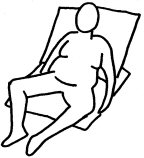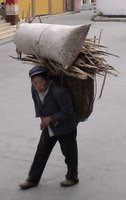 Someone
Someone posted about the importance of breath when giving birth.
Well, I asked my wife, who has been through two difficult and one "normal" birth. Her reply was that: "The assumption is that if you are aware of your breath, you don’t lose control!
"I’m not so sure about because being aware of the breath whilst giving birth is extremely difficult. For me –anyway...
"You were there at several births, you must have your own ideas..."
Well, my recollection of the births was, to be honest, awe-filled panic as much as anything else. I tended to block the whole process by falling asleep after many hours of traumatic labour, abandoning my exhausted wife. So I suppose I have to concur with Donna Farhi, in the extract from her excellent
"The Breathing Book" copied below, that well meaning husbands could very well get in the way of a process dictated by Nature...
I pick up on Farhi's point about using breath to "tether" yourself to the moment...
The extract is from pages 208-210:
ChildbirthMany of my students who have taken yoga classes with me throughout their second pregnancies have reported that their new-found awareness of the pelvic diaphragm and of their breathing in general, made for a shorter and easier labour. These women also commented on how they felt more in tune with the process because they knew how to let their breathing spontaneously change in response to pain and exhaustion. I have since come to the conclusion a greater understanding of their breathing and movements that occur in the pelvis and lower abdomen can be invaluable to a woman in childbirth.
There are differing opinions about the efficacy of using specific breathing patterns during birthing. I tend to agree with Carl Jones, author of
Alternative Birth, who feels that concentrating on any one set pattern of breathing can "interfere with a spontaneous response to labor and can actually impede labor's progress." He also found that bedside fathers often became so focused on coaching a set breathing pattern that they tended to neglect more effective means of labor support, such as massaging the laboring woman or providing verbal encouragement. It seems clear that since most of us breathe poorly and we tend to meet difficulty with tension rather than relaxation, a heightened awareness of breathing give a woman the ability to respond both spontaneously and intelligently to the challenge of her child's birth.
If you feel that learning a breathing technique would give you confidence many current authorities on birth training now recommend the Bradley Method, a system that teaches slow breathing rather than shallow, panting breathing characteristic of the Lamaze method. Rapid chest breathing can lead to hyperventilation, a condition that will make you feel light-headed and even numb in your hands and fingers. This isn't good for you of for you baby. If during particularly heavy contractions you have breathed so rapidly that you begin to feel symptoms of hyperventilation, take a long and slow breath out and immediately your next breath will be fuller. This slow diaphragmatic breathing can provide a focal point for your concentration when the going gets rough.
During the second stage of labor women are often encouraged to push strenuously during contractions - which many women accomplish by holding their breath. Breath holding during the second stage has been associated with a drop in fetal heart rates and a concomitant reduction in the fetal oxygen supply. Despite our cultural predilection to treat birth as a competitive athletic event (with speedy birth considered a successful one), studies show that when women are allowed to follow their own inclinations they are able to deliver as quickly as mothers that were actively encouraged to push. They also reduced their chances of tearing and requiring an episiotomy by up to 40 percent. Rahima Baldwin, author of
Special Delivery, advises pushing only when there is an "irresistible urge" to do so and suggests that when you feel the need, you help your body push effectively by expanding out through your lower belly and perineum. She adds: " Most of us, when we think of pushing as in a having a bowel movement, think of pushing in on the belly as we hold our breath. This is just the opposite of what you need to do in the second stage to birth your baby. Your baby's head requires that everything down below is open and stretches as the head bulges forward on your perineal tissue. Remember, when you breathe in fully and allow your belly to expand the diaphragm presses downward, which can only help the birthing process.
In the Physiologic Approach to the second stage of labor (a modern approach that is actually a return to older midwife wisdom), the mother is "encouraged to breathe spontaneously while keeping her mouth open, relaxing her jaw and throat, and making as much noise as she likes." She is also cautioned "to avoid cutting off the flow of breath, as an open glottis (throat) is associated with opening in the pelvic and vaginal areas."
All of these approaches reflect the basic belief that it can be a trap to go into labor with a set idea about how it should progress and a prescribed way of breathing throughout. While following a technique may give you confidence, it can also prevent you from making choices in response to what is actually happening (rather than what you imagined should happen). These choices also include letting your breathing change in response to your body's cues.
Regardless of the particular approach you choose for your labor, it will be crucial to remain attentive to what is happening rather than being overwhelmed with fear or panic. Your breathing can act as a palpable lifeline to keep you tethered to the present moment. If you have a heightened awareness of your body and the effects that different body positions and breathing techniques have on you personally, you will be better able to respond to what is happening and to ask for what you need, whether that be a change of position or more support from you partner.
As one of my students said: "During my first labor I didn't even know where my perineum was or how to breathe in such a way as to open rather than close there. During my second labor, I knew not only where to open but how to do it, and I felt I could trust my body because it was a body I knew rather than a stranger to me."
- Donna Farhi
Just watching a birth is truly an unforgettable experience - we all make a similar entrance to the planet - except where surgical intervention happens. It is one of the two great transitions, the other being our exits, which are a lot more varied in their denouements.
But some say that each breath contains a birth and a death - the Tibetans called it
bardo - although it is totally hard to clock this, when considering the momentous nature of a human birth. Yet when you consider that we, each of us, have an alloted number of breaths, whether pre-ordained or not...then the preciousness of each one of them is not really up for debate...is it?
And those of us who have ever truly gasped for a breath will know that our lifeforce does ride on the wave of our inhalations and exhalations...
Going back to the starting point, I would just like to thank my wife for her bravery, endurance and unconditional love in giving birth to our three beautiful daughters who are now 30, 29 and 23.
And there is one last thing: the very first breath a child takes - when they suck in the very essence of life and begin what always ends up being an amazing adventure... That is really quite something special.
I remember our youngest who emerged after a difficult breech birth, blue and lifeless, and then she took a breath...and started to live an independent existence... Totally amazing!!!




















